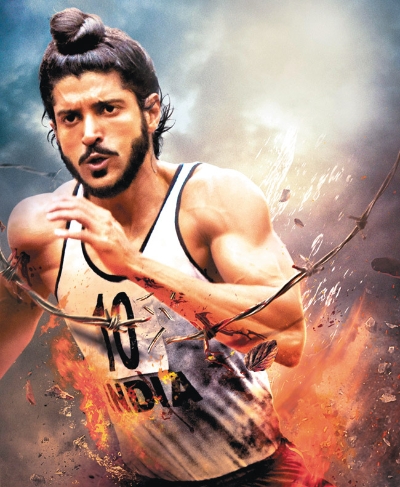Bollywood Film Fest, JAI HO!
Giddy romance, shirt-bursting heroes, decked-out heroines, pulsating dance numbers – this year’s Bollywood Film Fest has that and more. Explosive mega hits include the visually stunning Ram-Leela (think Romeo and Juliet), Krrish‘s sci-fi superhero, Kai Po Che! about three friends who dream of opening a cricket-training academy, and opening night’s Bhaag Milkha Bhaag, a blood-pumping true story about Milkha Singh, who overcame poverty and India’s devastating 1947 partition to become an Olympic runner and one of the country’s legendary sports icons. In addition, several films reveal a changing tide in Indian cinema, where fantasy and melodrama make way for realism and the tackling of weighty social issues.
mw-art-010814-bhaagmilkhabhaag
Bollywood rings in sex ed with Shuddh Desi Romance, addressing previously taboo topics like premarital sex, abortion, choosing a partner over arranged marriage, cohabiting with no marriage plans at all and STDs. The topic comes at a time when the world’s eyes are on India’s struggle with a rash of gang rapes. (While the filmmakers can be lauded for addressing sexuality and its issues, the detractions in this forward-thinking film are characters whose idea of progress is to “mirror” Western culture by drinking Coca Cola and smoking.) Conspicuously missing from this and the following films are the over-the-top dance numbers that exemplify the glamor that is Bollywood.
In Listen … Amaya, a young woman, Amaya, is blindsided by her widowed mother’s profession of attraction to their also-widowed family friend who frequents their coffee shop. Early on, mom and daughter talk freely, with Amaya confiding that her date was pressuring her for sex. “I hope you didn’t overreact,” responds mom to the feisty girl. Mom soon gets a fiery response of her own from Amaya, who feels her mother is betraying their memory of Dad.
Set in 1953, Lootera is a brooding, atmospheric, wintry gem. Say bye to flashy Bollywood in this part-romance, part-heist thriller. Ranveer Singh (star of Ram-Leela) plays archaeologist Varun with subtlety, and Vikramaditya Motwane directs with unexpected tenderness and restraint. Varun’s work takes him to a bucolic town, where he catches the attention of a respected landowner’s daughter. But Varun is hiding a troubled past in this story of love and redemption.
Hear ye, hear ye, zombie lovers! The genre has arrived on Mumbai’s shores, or should we say on the beaches of party haven Goa in Go Goa Gone. Three stoners set out for a rave populated by drug-dazed Westerners. Things turn rotten when what starts out as a Pinocchio-like wonderland has the revelers morphing not into donkeys, but zombies. For one reason or another, our clueless protagonists haven’t imbibed the mysterious red pill – the newest, best high – that leaves the all-foreign partygoers decomposing and salivating for human flesh. The xenophobic metaphor hits you over the head. “It’s globalization. Foreigners brought it. First AIDS, now zombies,” says one of the trio. Can we fault them for poking some truth-made-in-jest fun at the infamous drug culture that has flourished there since the 1960s, when peaced-out foreigners arrived on the idyllic shores? Spot tributes to Arnold’s “I’ll be back,” to MJ’s Thriller, the Evil Dead and Sixth Sense (“I ‘kill’ dead people”). The LOL moment comes when a sweeping dance soundtrack kicks in while a female zombie lumbers after one of our dashing male leads through misty country hills. As happens in every Bollywood romance, the sequence fades to slo-mo, with the “dancers” playing hide and seek around the trunk of a tree as he attempts to flee.
Rajini Effect and Daadi round out the selections. The former is a quirky, if not bizarre, film about a Japanese man who dreams of being a Bollywood star. Daadi is a short about an aging actress living in Harlem and coming to terms with her fading glory.
This year marks 101 years of Indian cinema.
the TICKET stub
BOLLYWOOD FILM FESTIVAL
When: Through Jan. 26
Where: Honolulu Museum of Art Doris Duke Theatre
Cost: $12 each, $96 for a flash pass
More Info: honolulumuseum.org






